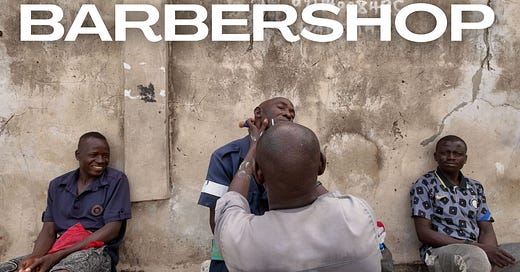I’m writing these words from an uncomfortable chair in Amsterdam, halfway through a five-hour layover. LOS → AMS → MAD heading to run my second marathon ever.
It’s the first time I come back to Europe after a long, intense month in Lagos. Among all the challenges of living there, running at 6:30 AM with 34°C and 95% humidity has been one of the toughest. The sweat kicks in before even starting to move.
I wanted to let life soak in more before turning what I lived into stories. But the truth is, my mind is still wired in one direction, so here it is, a few raw, incomplete frames of what life in Lagos,
Nigeria, looks like.
Before diving in: last week, I published two interviews with brilliant writers and curators here on Substack, you can check them at these links: The Sunday Interview & Darkrooms Magazine.
Below is an extract.
“What I love about photography are its limitations. You’re presenting a frame of a continuous and ever-changing life, capturing something that no longer exists. And if done well, it has the power to move souls and change the world for the better.”
LAGOS, NIGERIA
The following short videos are intentionally made without explanation, like a quick blink into a life that is not ours.
Enjoy them and let me know which fragments you would turn into a full story.
Balogun Market: the very first and mandatory stop in any new city
Street Barber: Stories told by old clippers
Makoko: Life inside a floating world
Lekki - Epe Expressway: the heart of Lagos Island
Growing Fish: Where every piece of land becomes the way to live
Let me know if you enjoyed this minimal interactive format.
Until the next one,
Much love.
F
I talk about the first impression from Lagos in this episode:







These are great - I'm most drawn to the Makoko and Growing Fish films - I think both of these would make excellent projects, so much to build on there.
That definitely was 'like a quick blink into a life that is not ours', Francesco It shows slices of life in Nigeria we (who have not been there) don't know about. I would say you're the best judge of what story should be made into something bigger, but since you ask my first thought about it would be the barbershop, as it facilitates hearing stories from people at (relative) ease, which could possibly make us understand better what their world feels like, as they are their stories. The footage from a busy marketplace may be too overwhelming to really understand what's underneath other than poverty and the need to survive.